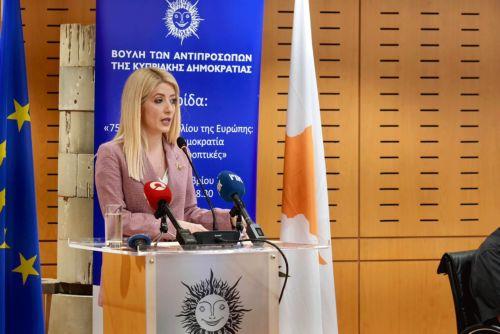The importance of the Council of Europe (CoE) was highlighted during an event on the ‘75 years of operation of the Council of Europe: Republic of Cyprus – benefits and prospects’, which was organised by the House on Monday in Nicosia.
House President Annita Demetriou referred to the history of the establishment of the CoE in 1949 and the accession of Cyprus on May 24, 1961.
“The greatest achievement of the Council of Europe is the establishment of the European Convention on Human Rights and Fundamental Freedoms (ECHR), which was signed in Rome in 1950 and entered into force in 1953,” Demetriou said.
Referring to the work of the Parliamentary Assembly of the Council of Europe (PACE), Demetriou said this “is extremely important for our country”.
PACE president Theodoros Roussopoulos in an audio-visual message, said PACE was in the process of creating a new International Court where Russia’s offensive against Ukraine should be discussed.
Referring to the crisis in the Middle East, Roussopoulos called on all parties to show restraint in order to avoid a major regional war.
In her address through an audio-visual message, Commissioner for Health and Food Safety Stella Kyriakides, who previously served as president of PACE and head of the Cypriot delegation to PACE, said she knows “first-hand the enormous scope of the project of the organisation and its importance for Cyprus, the difference that the CoE can make for all of us”.
She also said that she is watching “with anxiety the war conflicts around us”, pointing out that “today our common vision and values that the CoE advocates are more important than ever.”
In her address through an audio-visual message, PACE general secretary Despina Hatzivasiliou said that one of the key priorities of the fourth CoE summit, held last year, was the role and participation of young people, indicating that the participation of young people in decision-making processes improves the effectiveness of public policies and strengthens democratic institutions through open dialogue.
“We need to rethink and innovate democracy so that it is able to solve today’s problems and at the same time be ready to face tomorrow’s challenges. We can only do this if young people take the floor and participate equally in the political debate and in the decision-making process”, she said.
Head of the Cypriot delegation, Disy MP Nikos Tornaritis, said the action developed within the framework of PACE “is particularly important both because of the huge range of issues it covers – human rights, democracy and rule of law – as much as because of the possibilities and opportunities offered for deepening our bilateral parliamentary relations and for the development of parliamentary diplomacy in general.”
Member of the Cypriot delegation, Akel MP George Loukaides, said “there is reduced or no visibility of the CoE in Cyprus” and pointed out that if the CoE did not exist, things would be much worse in terms of the defence of democratic values, human rights, the environment and the rule of law.
Member of the Cypriot delegation, independent MP Kostis Efstathiou, said that the intrusion of the Committee of Ministers makes the decisions of the CoE an “empty letter”, pointing out that there are decisions that remained without implementation for 30 years, such as the one concerning Titina Loizides.
Associate professor of public law and human rights law and chairman of the Law Department at the University of Cyprus, Dr Costas Paraskeva, expressed his concern about the extent to which the two communities of Cyprus respected the second part of the Constitution of the Republic of Cyprus since its establishment and whether fundamental rights were respected in the first three years of the Republic.
President of the Cyprus Youth Council Constantinos Loizou said that the international platform of the CoE allows Cyprus to present its positions in international forums. He also expressed particular pride for Cyprus’ participation in the CoE’s Advisory Council on Youth.
President of Cyprus Youth Diplomacy Amalia Avraham pointed out that the relationship with the CoE is of special importance for Cyprus as an occupied state.
Alekos Modinos, who won a case against Cyprus in 1993 after appealing to the ECHR, referred to the history of the process that followed his appeal to the ECHR against Cyprus and the decriminalisation of homosexuality in Cyprus in 1998. “Human rights are not more or less important or prioritised. There cannot be two standards,” he stressed. “Without the CoE, our world would be much worse,” he added.
Titina Loizides, who appealed against Turkey to the ECHR in 1996, referred to the main points in her case. “I experienced the Cyprus issue through its legal dimension, which concerns the violation of human rights by the Turkish invasion. I saw the credibility of human rights being challenged at the political and legal level”, she underlined.







Click here to change your cookie preferences